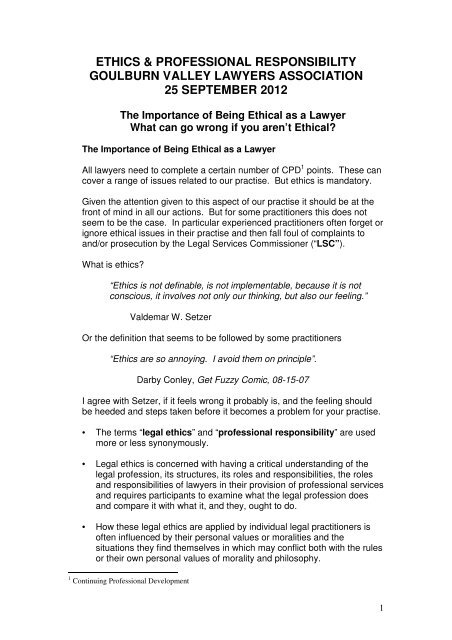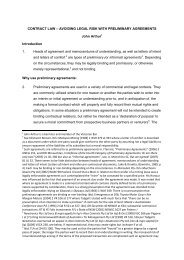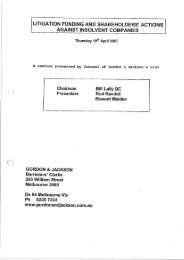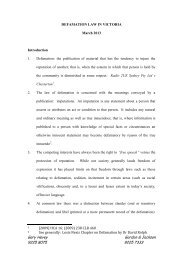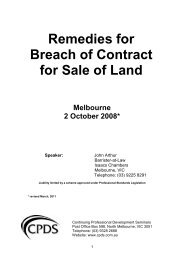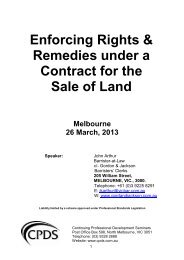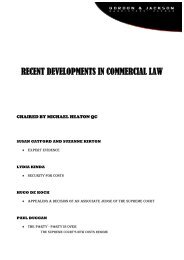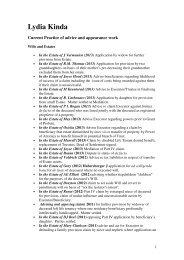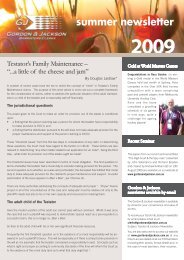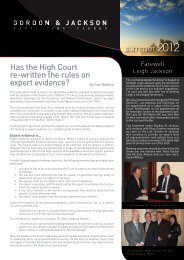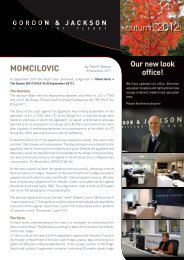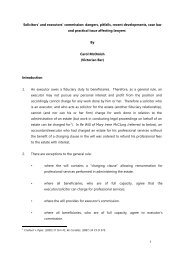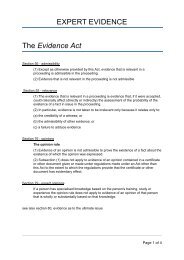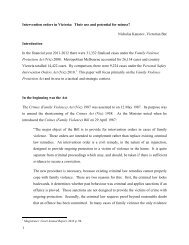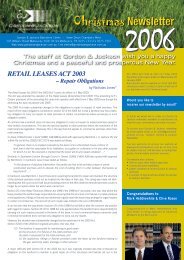Ethics and - Gordon & Jackson
Ethics and - Gordon & Jackson
Ethics and - Gordon & Jackson
You also want an ePaper? Increase the reach of your titles
YUMPU automatically turns print PDFs into web optimized ePapers that Google loves.
ETHICS & PROFESSIONAL RESPONSIBILITY<br />
GOULBURN VALLEY LAWYERS ASSOCIATION<br />
25 SEPTEMBER 2012<br />
The Importance of Being Ethical as a Lawyer<br />
What can go wrong if you aren’t Ethical?<br />
The Importance of Being Ethical as a Lawyer<br />
All lawyers need to complete a certain number of CPD 1 points. These can<br />
cover a range of issues related to our practise. But ethics is m<strong>and</strong>atory.<br />
Given the attention given to this aspect of our practise it should be at the<br />
front of mind in all our actions. But for some practitioners this does not<br />
seem to be the case. In particular experienced practitioners often forget or<br />
ignore ethical issues in their practise <strong>and</strong> then fall foul of complaints to<br />
<strong>and</strong>/or prosecution by the Legal Services Commissioner (“LSC”).<br />
What is ethics?<br />
“<strong>Ethics</strong> is not definable, is not implementable, because it is not<br />
conscious, it involves not only our thinking, but also our feeling.”<br />
Valdemar W. Setzer<br />
Or the definition that seems to be followed by some practitioners<br />
“<strong>Ethics</strong> are so annoying. I avoid them on principle”.<br />
Darby Conley, Get Fuzzy Comic, 08-15-07<br />
I agree with Setzer, if it feels wrong it probably is, <strong>and</strong> the feeling should<br />
be heeded <strong>and</strong> steps taken before it becomes a problem for your practise.<br />
• The terms “legal ethics” <strong>and</strong> “professional responsibility” are used<br />
more or less synonymously.<br />
• Legal ethics is concerned with having a critical underst<strong>and</strong>ing of the<br />
legal profession, its structures, its roles <strong>and</strong> responsibilities, the roles<br />
<strong>and</strong> responsibilities of lawyers in their provision of professional services<br />
<strong>and</strong> requires participants to examine what the legal profession does<br />
<strong>and</strong> compare it with what it, <strong>and</strong> they, ought to do.<br />
• How these legal ethics are applied by individual legal practitioners is<br />
often influenced by their personal values or moralities <strong>and</strong> the<br />
situations they find themselves in which may conflict both with the rules<br />
or their own personal values of morality <strong>and</strong> philosophy.<br />
1 Continuing Professional Development<br />
1
Professional Responsibility<br />
The Rules<br />
As a regulated profession we have rules we are required to abide by.<br />
Legal ethics requires us to know the disciplinary rules regulating our legal<br />
profession. Some rules are statute based with punitive sanctions like the<br />
Legal Profession Act 2004 (“the Act”) (Amended 2/5/2012)<br />
Some rules have been drawn up or endorsed by professional bodies like<br />
the Law Institute of Victoria (“LIV”) (Professional Conduct <strong>and</strong> Practice<br />
Rules 2005) (“the Rules”) <strong>and</strong> the Victorian Bar (“the Bar”) (Victorian Bar<br />
Practice Rules) (the Bar Rules”). In addition we now also have to keep<br />
the Civil Procedure Act 2010 in mind.<br />
Some sections of the Rules relevant to all lawyers are:<br />
• 2.4.27 Holder of local practising certificate—show cause event<br />
• 3.4.11 How <strong>and</strong> when must disclosure be made to a client?<br />
• 4.4.2 Unsatisfactory professional conduct<br />
These 3 are reproduced as a Schedule to this paper but there are, of<br />
course, many more. We all need to become familiar with the Act. If<br />
unsure when acting for a client, check the Act <strong>and</strong> the relevant Rules, or<br />
seek advice from your regulatory body (LIV or the Bar) before committing<br />
yourself to a step which could see you fall foul of the Legal Services<br />
Commissioner, <strong>and</strong> join the ranks of those appearing before VCAT.<br />
The Act currently consists of some 620 pages dealing with issues of how<br />
lawyers are admitted to practise, remain in practise, <strong>and</strong> what issues or<br />
behaviour can cause them to have their practising certificates cancelled,<br />
suspended, (in other words “lose their ticket”) facing fines <strong>and</strong> paying the<br />
costs of the Legal Services Commissioner to bring them to the Tribunal.<br />
The Act empowers the Legal Services Commissioner, (“the<br />
Commissioner”) currently Mr Michael McGarvie, <strong>and</strong> his staff to h<strong>and</strong>le<br />
complaints from the public, the profession 2 <strong>and</strong> even the judiciary. 3<br />
To put the following statistics into perspective according to the Legal<br />
Services Board’s (“LSB”) website states that there are currently 16,727<br />
practitioners registered in Victoria. In 2010-11 1,263 new practitioners<br />
were admitted, an increase of 6%. 56% of the legal profession were male<br />
2 Legal Services Commissioner v D'Aless<strong>and</strong>ro (Legal Practice) [2009] VCAT 1129 (2 July 2009)<br />
3 Legal Services Commissioner v Griffin (Legal Practice) [2010] VCAT 484 (21 April 2010)<br />
Oldham v Law Institute of Victoria (Legal Practice) VCAT 571 (30 May 2012).<br />
2
<strong>and</strong> 44% female. Of these 16,7272, 15,000 are located in the city or<br />
suburbs <strong>and</strong> 1,200 in the country. The remaining 441 are located either<br />
overseas or interstate. In 2010 the Commissioner received 2200 some<br />
complaints. Most of these were resolved with 10 practitioners being<br />
referred to VCAT for findings of professional misconduct. In 2011 there<br />
were 15, in 2012 to date I have counted 19 reported on the Legal Services<br />
Board’s (“LSB”) website, most heard in VCAT but 4 were heard by the<br />
Supreme Court. In reviewing the reported cases the breadth of the<br />
complaints made to the LSB is surprising, but by far the greatest number<br />
related to a failure by lawyers to communicate. Initially with their clients<br />
<strong>and</strong> once a complaint had been lodged, a failure to respond to the<br />
Commissioner’s request for information in relation to a complaint. In most<br />
cases these were later resolved. Where they couldn’t be resolved, the<br />
lawyer often faces a reprim<strong>and</strong> as well as a fine as well as meeting the<br />
Commissioner’s costs of bringing the action.<br />
How do you prevent a Complaint?<br />
Communication<br />
Communicate with all parties but especially your client. The dilemma all<br />
legal practitioners face is cost. Every time we communicate with our client<br />
it costs them. Most non-lawyers are not aware of lawyers’ responsibilities,<br />
even when it is spelt out to them in disclosure letters. For some the only<br />
communication that seems to make an impact is the dollar figure on the bill<br />
they receive, whether it is large or small.<br />
Despite this, we cannot be cowed into failing to advise clients of costs<br />
consequences of various actions, incurring further costs in seeking their<br />
instructions in the face of changed circumstances <strong>and</strong> advising of the likely<br />
outcomes of continuing the current action. We need to do this even when<br />
we think they will confirm our current instructions.<br />
When dealing with a new client you need to set the pattern of behaviour<br />
from the outset <strong>and</strong> refer back to this initial advice, if need be, as the<br />
relationship continues. The client needs to be aware that you are not<br />
allowed to act without their instructions, in fact are prohibited from doing so<br />
either by legislation or professional regulations. Regrettably this need for<br />
communication adds to the client’s costs. Conversely, a client who is<br />
continually contacting you for advice needs to be aware that all those<br />
phone calls, emails, are going to generate costs they are liable for.<br />
Situations where there is no time to draft <strong>and</strong> provide a Costs Disclosure<br />
Letter or Agreement are rare. Verbal advice of costs with verbal<br />
acceptance can cover an emergency or rush situation, but should always<br />
be immediately followed up by confirming written documentation. This<br />
needs to be done not only to meet your obligations under the law, but you<br />
may well be relying on it in a costs fight, even if you win the case.<br />
3
Even where all these steps have been undertaken, lawyers still need to be<br />
aware of how their costs are viewed. If the matter is litigious <strong>and</strong> proceeds<br />
to a hearing, although the client may be successful in winning their case, if<br />
their judgment is wiped out by your costs it will be a hollow victory. Rarely<br />
does “it’s the principle that’s important” last to judgment.<br />
In some areas, like Family Provision claims against Estates, costs of the<br />
applicant have generally been borne by the Estate of the deceased.<br />
However, recently courts have been reluctant to award what they consider<br />
to be excessive costs <strong>and</strong> in some cases have either refused costs 4 or<br />
capped them. 5<br />
Currently the Law Reform Commission is reviewing the legislation <strong>and</strong><br />
cases in relation to costs. Practitioners in this area will be aware of the<br />
courts already limiting costs in small estates by disallowing affidavits prior<br />
to Mediation.<br />
In addition you need to ensure you keep good, legible, dated file notes.<br />
Some complaints don’t come in for some time <strong>and</strong> trying to remember<br />
what you told someone five years back is almost impossible. 6 Not keeping<br />
file notes is considered unprofessional by the courts. Emails can be<br />
stored electronically <strong>and</strong> .pdf copies of relevant documents are worth<br />
storing especially with the reducing cost computer disk space.<br />
Ensure your instructions are current<br />
Barristers are familiar with being told on the day of trial that “the matter has<br />
settled”. In the euphoria of settling a difficult case the lawyer may have<br />
forgotten to communicate this fact to Counsel. The client will not be happy<br />
to be paying Counsel’s fees when they consider the matter done <strong>and</strong><br />
dusted.<br />
However a worse scenario is for a solicitor to continue to act in a<br />
proceeding <strong>and</strong> advising his opponent that the client had refused their<br />
offer to settle. Quite by accident his opponent discovered the Plaintiff had<br />
died some days before so would have been unable to give those<br />
instructions.<br />
I can only imagine the judge’s reaction <strong>and</strong> attitude to the lawyers for the<br />
plaintiff. A case on point is listed in this paper.<br />
4 Re Carn-Moerth-v-Moerth <strong>and</strong> another;Moerth-v-Mac Bean (No 2) [2011] VSC 275,<br />
Gardiner AsJ Related [2011] VSC 176.<br />
5 Cangia v Cangia (No 2) 5 [2008] VSC 556<br />
6 Bale v Mills [2011] NSWCA 226, Allsop P, Giles JA <strong>and</strong> Tobia AJA para 15 <strong>and</strong> 17.<br />
4
What can go wrong if you are not ethical<br />
Listed below is a summary of some recent cases giving examples of the<br />
type of complaints the Commissioner deals with. These are grouped<br />
according to type of behaviour rather than in strict chronological order.<br />
Breaches of Practising Regulations<br />
Purporting to witness a signature in the absence of the relevant<br />
person<br />
Legal Services Commissioner v Comito (Legal Practice) [2011] VCAT<br />
497 (24 March 2011)<br />
Reprim<strong>and</strong>ed, fined $10,000, pay LSC’s costs $5,519.<br />
Legal Services Commission v Lamplugh (Legal Practice) [2012] VCAT<br />
279 (5 March 2012).<br />
Practitioner witnessing signature on guarantee in absence relevant<br />
person<br />
Legal Services Commissioner v Turner (Legal Practice) [2007] VCAT<br />
1986 (24 October 2007)<br />
Reprim<strong>and</strong>ed, fined $5,000 <strong>and</strong> pay LSC’s costs.<br />
Legal Services Commissioner v <strong>Jackson</strong> (Legal Practice) [2012] VCAT<br />
272 (2 April 2012)<br />
Forged his wife’s signature on an application to ASIC <strong>and</strong> on 6 tax<br />
refund cheques deposited in the parties’ joint bank account.<br />
Pleaded guilty, was ordered to pay $3,552.90 in LSC’s costs.<br />
Charging for retrieval of stored documents where client not advised<br />
in advance<br />
Legal Services Commissioner v Rose (No. 2) (Legal Practice) [2007]<br />
VCAT 2465 (17 December 2007)<br />
Paid LSC’s costs $6,714.00<br />
5
Failing to deliver up file to client when dem<strong>and</strong>ed<br />
Legal Services Commissioner v Nixon (Legal Practice) [2007] VCAT<br />
1695 (31 July 2007)<br />
Reprim<strong>and</strong>ed, fined $1,000 on 2 charges, <strong>and</strong> LSC’s costs $1,750.<br />
Failure to hold current practising certificate<br />
Legal Services Commissioner v Owens (Legal Practice) [2010] VCAT<br />
1686 (14 October 2010)<br />
Lawyer suffering from depression, 8 charges were proved, lawyer<br />
was ordered not to apply for practising certificate for 5 years.<br />
Taking a commission without authority<br />
Legal Services Commissioner v Hession (Legal Practice) [2010]<br />
VCAT 1687 (5 October 2010)<br />
Lawyer transferred $109,000 in unauthorised commission as<br />
Executor of an Estate.<br />
Fined $30,000, LSC’s costs $38,161.50, <strong>and</strong> ordered to attend a<br />
course on Wills <strong>and</strong> Estates management.<br />
Competency as a lawyer<br />
Failure to reach or maintain reasonable st<strong>and</strong>ard of competence<br />
<strong>and</strong> acting in conflict of interest<br />
Legal Services Commissioner v McNamara (Legal Practice) [2011]<br />
VCAT 1228 (1 July 2011)<br />
Lawyer gave advice to Executor <strong>and</strong> beneficiary widow, suspected of<br />
suffering from dementia. Conflict of interest <strong>and</strong> acting beyond his<br />
expertise <strong>and</strong> knowledge.<br />
Charges proved. Adjourned to further hearing 11 August 2011.<br />
Failing to complete work promptly <strong>and</strong> communicate with client<br />
Legal Services Commissioner v Morgan (Legal Practice) [2010]<br />
VCAT 1814 (22 October 2010)<br />
Found guilty of 6 charges of unsatisfactory professional conduct <strong>and</strong><br />
to use his best endeavours to complete legal work. Not to apply for<br />
Practising Certificate October 2011 (12 months), pay LSC’s costs.<br />
6
Conflict of Interest<br />
Failure to avoid conflict of interest <strong>and</strong> disclose interest in a<br />
transaction<br />
Legal Services Commissioner v Francis (Legal Practice) [2006] VCAT<br />
690 (13 April 2006)<br />
2 Charges found, 2 fines $30,000 <strong>and</strong> $17,500, LSC’s costs to be<br />
taxed.<br />
Acting in conflict of interest in a property matter<br />
Legal Services Commissioner v Harle (Legal Practice) [2008] VCAT<br />
2301 (21 October 2008)<br />
Practising Certificate cancelled for 3 years, pay LSC’s costs.<br />
Failure to get client to sign Form 2 acknowledgement of solicitor’s<br />
interest in the company loaning money to the client.<br />
Legal Services Commissioner v Johnston (Legal Practice) [2011]<br />
VCAT 1366 (11 July 2011)<br />
Reprim<strong>and</strong>ed, fined <strong>and</strong> ordered to pay LSC’s costs.<br />
Failing to keep business interests <strong>and</strong> legal practice separate<br />
involving misappropriation of client’s funds.<br />
Legal Services Commissioner v Brereton (Legal Practice) [2008]<br />
VCAT 2073 (7 October 2008)<br />
Practising certificate cancelled, not able to apply till 2013, or for<br />
practising certificate to deal with Trust Money till 2018, ordered to pay<br />
LSC’s costs of $145,000.<br />
Failure to disclose costs<br />
Failure to provide a Costs Agreement<br />
Legal Services Commissioner v Nowicki (Legal Practice) [2011]<br />
VCAT 1003 (24 May 2011)<br />
Reprim<strong>and</strong>, fined $15,000 <strong>and</strong> LSC’s costs.<br />
7
Failure to communicate with client <strong>and</strong> confirm instructions<br />
Legal Services Commissioner v Brott (Legal Practice) [2011] VCAT<br />
110 (7 February 2011)<br />
The Tribunal found 4 charges proved of instituting proceedings<br />
without seeking client instructions. The lawyer was referred to be<br />
struck off the roll of practitioners <strong>and</strong> ordered not to re-apply for a<br />
practising certificate till 2019, 8 years.<br />
Failing to communicate properly with clients regarding<br />
proceeding<br />
Legal Services Commissioner & Ors v Jayakody (Legal Practice)<br />
[2008] VCAT 2075 (7 October 2008)<br />
Reprim<strong>and</strong>, $3,000 fine <strong>and</strong> pay LSC’s costs.<br />
Misleading a client regarding a VOCAT application<br />
Legal Services Commissioner v Horsley (Legal Practice) [2011]<br />
VCAT 875 (27 April 2011)<br />
Reprim<strong>and</strong>, fine <strong>and</strong> pay LSC’s costs.<br />
Failing to advise clients<br />
Honesty<br />
Legal Services Commissioner v Cassidy (Legal Practice) [2009]<br />
VCAT 2647 (8 December 2009)<br />
Reprim<strong>and</strong>, fine <strong>and</strong> pay LSC’s costs of $15,891.63.<br />
Forging a medical certificate (previous complaints)<br />
Theft<br />
Legal Services Commissioner v Johal (Legal Practice) [2011] VCAT<br />
1390 (14 April 2011)<br />
Reprim<strong>and</strong>, fined $3,500 <strong>and</strong> to pay LSC’s costs on County Court D<br />
Scale.<br />
Mr Ali Abou-Eid pleaded guilty to 2 counts of obtaining property by<br />
deception, was sentenced to 24 months imprisonment. Application<br />
made pursuant to 2.4.42 of the LPA to remove his name from the<br />
Roll. AsJ Zammitt made the Orders on 16 February 2012.<br />
8
R v Andre di Cioccio [2012] VSC 28 24 February 2012, Macauley J<br />
Mr di Cioccio found guilty of misappropriating $2.6M, $691,000 money<br />
entrusted to him by his clients.<br />
Sentenced to 7 ½ years imprisonment. Compensation orders made<br />
in favour of the LSB for claims made on the Fidelity Fund in the sum<br />
of $172,492.35.<br />
R v Tansey [2012] VSC 221 (31 May 2012), Almond J<br />
Found guilty of 25 charges of theft totalling $1.9M stolen from clients<br />
between 1999 <strong>and</strong> 2004. Court ordered compensation to be paid to<br />
the Fidelity Fund of $318,047 in respect of claims made by Tansey’s<br />
clients. Tansey sentenced to 4 years imprisonment.<br />
Defrauding the State Revenue Office<br />
Legal Services Commissioner v Szental (Legal Practice) [2007]<br />
VCAT 1835 (2 October 2007)<br />
Solicitor attempted to defraud SRO, repaid monies, pleaded guilty to<br />
criminal charges, inherited money, made donations to charity,<br />
Practising Certificate cancelled till 2013.<br />
Plagiarism in an application for Masters<br />
Legal Services Commissioner v Keough (Legal Practice) [2010]<br />
VCAT 108 (3 February 2010)<br />
Solicitor pleaded guilty to plagiarism in obtaining a Master of Health<br />
<strong>and</strong> Medical Law. Practising Certificate cancelled <strong>and</strong> solicitor not to<br />
reapply before October 2010. Pay LSC’s costs.<br />
Falsifying resume<br />
Legal Services Commissioner v Spiceh<strong>and</strong>ler (Legal Practice) [2012]<br />
VCAT 630 (14 May 2012)<br />
Three charges of professional misconduct for denying he had been<br />
charged with an offence, omitting details of his employment history,<br />
falsifying details of employment <strong>and</strong> engaging in legal practice<br />
without a valid practising certificate. His dishonest conduct was<br />
found inconsistent with a lawyer’s duty to act honestly <strong>and</strong> his<br />
“blatant, breathtaking lies”.<br />
Reprim<strong>and</strong> <strong>and</strong> unable to obtain a practising certificate until 2017,<br />
ordered to pay LSC’s costs of $5,935.90.<br />
9
False Statutory Declarations<br />
Solicitor Jonathan Wong was reprim<strong>and</strong>ed on 2 charges of<br />
misconduct at common law from submitting two false Statutory<br />
Declarations to the Migration Agents Registration Authority (the<br />
MARA).<br />
Wong was fined $15,000 <strong>and</strong> ordered to pay LSC’s costs of<br />
$12,000.<br />
Litigation complaints/Breaches of Duties to the Court<br />
Failing to discover relevant documents<br />
Legal Services Commissioner v Piva (Legal Practice) [2009] VCAT<br />
1981 (25 September 2009)<br />
Solicitor knowingly withheld document when giving discovery to the<br />
Supreme Court, document held information against solicitor’s case.<br />
Practising Certificate cancelled, solicitor not to reapply before<br />
September 2011, pay LSC’s costs.<br />
Failure to comply with duties to Court<br />
Legal Services Commissioner v Shulsinger (Legal Practice) [2010]<br />
VCAT 1497 (9 September 2010)<br />
Solicitor reprim<strong>and</strong>ed for neglecting to comply with duties owed to the<br />
Family Court. Three charges of professional misconduct fined<br />
$5,000, $1,000 <strong>and</strong> $1,000 respectively <strong>and</strong> $36,000 LSC’s costs.<br />
Legal Services Commission v Cantwell (Legal Practice) [2012] VCAT<br />
890 (23 April 2012).<br />
Solicitor found guilty of 4 charges of professional misconduct in<br />
misrepresenting to the County Court that his client in a serious<br />
criminal matter was ready to proceed to trial, that a barrister had been<br />
briefed to appear for the client <strong>and</strong> that funding was in place for the<br />
trial.<br />
Cantwell’s practising certificate was cancelled <strong>and</strong> he was banned for<br />
re-applying before 29 March 2013 <strong>and</strong> ordered to pay the LSC’s<br />
costs of $10,000.<br />
10
Tax Issues<br />
Failure to file tax returns for 13 years, practitioner bankrupted<br />
Legal Services Commissioner v Long (Legal Practice) [2011] VCAT<br />
1164 (10 June 2011)<br />
Lawyer pleaded guilty to charge of professional misconduct, returns<br />
filed following action by ATO, now meeting revenue obligations.<br />
Good character otherwise, Practising Certificate suspended for 4<br />
months. Fined <strong>and</strong> paid LSC’s costs $12,000.<br />
Failure to Lodge Tax Returns <strong>and</strong> GST Returns<br />
Legal Services Commissioner v Moore (Legal Practice) [2010] VCAT<br />
742 (1 June 2010)<br />
Reprim<strong>and</strong>ed, fined $50,000 <strong>and</strong> paid LSC’s costs.<br />
NB: There were a number of other cases in 2012 so it appears that<br />
tax responsibility appears to be an ongoing issue for some<br />
practitioners.<br />
Trust monies<br />
Failing to deposit trust monies within required period<br />
Legal Services Commissioner v McCristal (Legal Practice) [2011]<br />
VCAT 231 (10 February 2011)<br />
Fined $25,000 <strong>and</strong> ordered to attend course on Trust account<br />
management <strong>and</strong> pay LSC’s costs.<br />
Failure to manage office <strong>and</strong> trust monies<br />
Legal Services Commissioner v Peacock (Legal Practice) [2008]<br />
VCAT 983 (2 June 2008)<br />
Practitioner failed to supervise his legal practice – another party<br />
utilised his office account to misappropriate monies from third parties.<br />
Practising Certificate downgraded to employee certificate, required to<br />
attend practise management course, reprim<strong>and</strong>ed with costs.<br />
Legal Services Commissioner v Coldham & Ors (Legal Practice)<br />
[2012] VCAT 74 (19 January 2012).<br />
11
Three lawyers failed to present 216 cheques totalling $300K between<br />
2004 to 2007 for moneys owed to barristers <strong>and</strong> expert witnesses.<br />
The cheques were deliberately withheld in order to reduce the level of<br />
debt in the law practice’s overdraft account.<br />
All 3 pleaded guilty but the Tribunal ruled that “dispositions falling<br />
short of cancellation or suspension of practising certificates have<br />
proven inadequate as to general deterrence.” Citing McCristal <strong>and</strong><br />
Quinn. 7<br />
Practising certificates suspended for 9 months <strong>and</strong> ordered to pay the<br />
LSC’s costs of $16K.<br />
Unqualified practice <strong>and</strong> receipt of trust monies<br />
Legal Services Commissioner v Rallis (Legal Practice) [2009] VCAT<br />
1445 (23 July 2009)<br />
Practitioner pleaded guilty to two counts of misconduct, unqualified<br />
practice <strong>and</strong> unqualified receipt of trust money. Practising Certificate<br />
cancelled, may not apply till 2014, monies to be repaid <strong>and</strong> LSC’s<br />
costs of $25,000.<br />
Legal Services Commission v M McAuley [2012] VCAT 159 (23<br />
January 2012)<br />
Practitioner received trust monies without holding the appropriate<br />
authorisation to do so, failed to act on her client’s instructions <strong>and</strong><br />
failed to respond to request for information from the LSC.<br />
Obtained $5,500 to obtain a second opinion from senior counsel in<br />
relation to quantum of damages likely regarding a personal injuries<br />
claim. She failed to seek this opinion <strong>and</strong> without authorisation<br />
applied the money to an outst<strong>and</strong>ing account incurred by the client’s<br />
family for an unrelated matter.<br />
Ms McAuley was reprim<strong>and</strong>ed, fined $8,000 <strong>and</strong> ordered to pay the<br />
LSC’s costs of $14,532.20.<br />
Legal Services Commissioner v S Dhanapala VCAT 23 May 2012.<br />
In partnership Dhanapala received $101K in trust monies while<br />
neither party held a practising certificate authorising them to receive<br />
trust monies. Dhanapala co-signed cheques but was considered<br />
naïve rather than wilful.<br />
Reprim<strong>and</strong>ed <strong>and</strong> ordered to pay LSC’s costs $4,000.<br />
7 Quinn v Law Institute of Victoria [2007] VSCA 122;<br />
Legal Services Commission v McCristal (Legal Practice) [2011] VCAT 23 (10 February 2011).<br />
12
Undertakings<br />
Failing to take steps to be released from an undertaking he was<br />
unable to complete <strong>and</strong> acceding to his client’s request to disburse<br />
trust funds contrary to his undertaking<br />
Legal Services Commissioner v D'Aless<strong>and</strong>ro (Legal Practice) [2009]<br />
VCAT 1129 (2 July 2009)<br />
Reprim<strong>and</strong>ed, fined $4,000 <strong>and</strong> LSC’s costs $3,357.60.<br />
Failure to honour undertaking within reasonable time<br />
Legal Services Commissioner v Sapountzis (Legal Practice) [2010]<br />
VCAT 1124 (24 June 2010)<br />
Reprim<strong>and</strong>ed <strong>and</strong> LSC’s costs $5,000.<br />
NON-LEGAL PRACTICE<br />
Carrying on business of an estate agent without the required<br />
license.<br />
Noone v Mericka & Ors [2012] VSC 101 (27 March 2012) Sifris J<br />
Action by Director of Consumer Affairs Victoria. Lawyer contravened<br />
Estate Agents Act 1980 (Vic) <strong>and</strong> Fair Trading Act 1999 (Vic) by<br />
carrying on the business of a real estate agent without the required<br />
license. Activities went beyond the exemption in Section 5(2)(e) of the<br />
Estate Agents Act 1980 (Vic).<br />
Dishonesty of Non-legal employee<br />
Law firm employee found guilty in the Magistrates Court of two charges<br />
of commencing employment in a law practice without having first<br />
informed his prospective employee of his previous relevant prior<br />
convictions. Law firm was not aware of his prior convictions. A law<br />
firm can employ an individual with prior convictions but must get the<br />
Board’s prior permission. Rules of integrity extend beyond licensed<br />
lawyers to “lay associates”. (August 2012 unreported).<br />
Convicted <strong>and</strong> fined $2,000. Ordered to pay the LSC’s costs $5,000.<br />
13
THE COST OF FAILING TO ACT ETHICALLY OR<br />
PROFESSIONALLY<br />
RECENT CASES IN THE COURTS:<br />
ENSURE YOU HAVE INSTRUCTIONS<br />
In the aftermath of Black Saturday 2009, a number of class actions were<br />
spawned, including one against a power company with a claim that the<br />
proximity of power lines to vegetation had caused a fire.<br />
In Matthews v SPI Pty Ltd 8 the group proceedings were prepared by an<br />
articled clerk who was obviously under pressure <strong>and</strong> lacking in<br />
supervision. Mr Keane had merely registered his interest on the firm’s<br />
website. No proper instructions were taken or advice given regarding<br />
likely costs consequences against Mr Keane as a representative plaintiff if<br />
he was unsuccessful The fact that writ incorrectly named defendants <strong>and</strong><br />
included an allegation of damage from a fire some 200 kms north of Mr<br />
Keane’s property also demonstrated the lack of preparation.<br />
After the matter had been issued <strong>and</strong> underway for some months, the firm<br />
discovered their representative plaintiff had not given instructions to make<br />
a claim or be a representative plaintiff. Even after realising this, it was<br />
some months before the firm took corrective action <strong>and</strong> informed the court<br />
<strong>and</strong> the defendant.<br />
The castigation of the law firm by the judge, not to mention the costs<br />
consequences both for the firm’s loss of revenue <strong>and</strong> having to pay the<br />
defendant’s costs was considerable. No quarter was given. The judge<br />
commented that group proceedings are now called “lawyer driven<br />
litigation” 9 .<br />
The defendant argued that allowing the proceeding to remain on foot,<br />
notwithst<strong>and</strong>ing a replacement representative plaintiff had been found <strong>and</strong><br />
her substitution ratified, that the court should exercise its authority to strike<br />
out the claim as an abuse of process. The court determined that<br />
practitioners must be made aware that issuing proceedings without the<br />
authority of a client is misconduct. The court decided not to exercise its<br />
authority to deal with the behaviour as contempt of court, but decided to<br />
refer the lawyer’s conduct in issuing <strong>and</strong> maintaining the proceeding to the<br />
Legal Services Commissioner.<br />
One of the reasons the court took this action was it considered striking out<br />
the application would be more punitive against the replacement<br />
representative plaintiff, <strong>and</strong> the group she represented rather than the<br />
8 Matthews v SPI Electricity Pty Ltd; SPI Electricity P/L v Utility Services Corporation Limited & Ors<br />
(Ruling No 1) [2011] VSC 1676 10 May 2011, Forrest J at 120.<br />
9 Kirby v Centro Properties Ltd [2008] FCA 1505, Finkelstein J.<br />
14
lawyers responsible. As the interest on any damages granted to the<br />
plaintiff flow from the date the proceeding was commenced. Striking out<br />
the pleading would have penalised the plaintiffs <strong>and</strong> the group she<br />
represented with a loss of some 27 months interest. However, the court<br />
restricted the plaintiff’s right to interest to commence from the date the<br />
representative plaintiff was substituted in July 2010, thus giving the plaintiff<br />
a benefit of some 9 months interest.<br />
Matthews v SPI Pty Ltd st<strong>and</strong>s out because it relates to Black Saturday<br />
<strong>and</strong> the number of plaintiffs affected, but, as we have seen above, similar<br />
breaches by lawyers have occurred in less public arenas.<br />
Oldham v Law Institute of Victoria (Legal Practice) [2012] VCAT 571 (30<br />
May 2012).<br />
Solicitor reported by Justice Forrest, LSC took action in VCAT for<br />
professional misconduct for issuing <strong>and</strong> maintaining legal proceedings in<br />
relation to two separate bushfire class actions without obtaining the<br />
appropriate authority or instructions from the nominated clients.<br />
This case again highlights the dangers of lawyers undertaking legal work<br />
in areas of law where their knowledge or experience is limited.<br />
Practising Certificate restricted for 2 years to the areas of building law,<br />
construction law, property law <strong>and</strong> owners corporation law. Ordered to<br />
pay $30,000 towards the costs of the proceeding.<br />
CONFLICT OF INTEREST – SOLICITOR/EXECUTOR<br />
In Walker v D’Aless<strong>and</strong>ro (2010) VSC 15, Forrest J found that the claim by<br />
the solicitor, appointed Executor under the Will of Ivy Rosalind Mary<br />
Pump, to the beneficiaries for a 3% commission, in addition to his costs for<br />
applying for Probate was made without full disclosure <strong>and</strong> advising the<br />
beneficiaries to seek legal advice so that they could give informed<br />
consent.<br />
Court ordered that the agreement by the beneficiaries to the payment of<br />
3% commission was unenforceable.<br />
In Re Estate of Zsuzanna Gray 2010 VSC 173, Daly AsJ followed Walker<br />
v D’Aless<strong>and</strong>ro. Estate of $885,000, fees charged for work on Probate<br />
some $22,000, which were assessed by the Law Institute as reasonable<br />
but did not take into account his “pains <strong>and</strong> trouble” as provided for in the<br />
deceased’s Will.<br />
Solicitor working in an atmosphere of suspicion <strong>and</strong> distrust, sought<br />
$35,000 commission, or 3.5% of corpus, such payment to include $22,000<br />
costs of the Probate <strong>and</strong> some $4,500 for assessment of those costs.<br />
Court only allowed $22,000 <strong>and</strong> $4,500 as sufficient for his “pains <strong>and</strong><br />
trouble”.<br />
15
COMPETENCY IN PLEADINGS<br />
In some cases the courts themselves have punished a lack of competency<br />
<strong>and</strong> expertise of legal practitioners by way of refusal to accept what it<br />
considers sub-st<strong>and</strong>ard pleadings.<br />
Gunns Limited v Marr [2005] VSC 251, Bongiorno J. At a Directions<br />
Hearing of the Matter, the Plaintiffs applied to file an amended Statement<br />
of Claim some 360 pages long with 528 paragraphs against some 20<br />
defendants. The Claim was filed in lieu of late Particulars of Claim,<br />
however the court, in dismissing the Statement of Claim, stated that “the<br />
function of a statement of claim is to set out with sufficient clarity the case<br />
which the defendant must meet”, limit generality of the allegations <strong>and</strong> to<br />
limit <strong>and</strong> define the issues to be tried. Bongiorno J found that the crossreferencing<br />
of paragraphs failed to assist <strong>and</strong> in fact “often renders the<br />
original paragraph at best ambiguous <strong>and</strong> at worst misleading”. The<br />
pleadings were described as prolix <strong>and</strong> that the “Court will not tolerate<br />
laxity of pleadings or deficiency of particulars to the disadvantage of those<br />
against whom the proceeding is brought”.<br />
His Honour went on to say that a new statement of claim should be<br />
accompanied by a detailed table of contents or index, a glossary of every<br />
term or phrase used in it which requires definition, <strong>and</strong> it should employ a<br />
uniform method of referring to the parties.<br />
Murphy v Council of the Municipality of Strathfield [2012] NSWSC 85<br />
(17 February 2012), Schmidt J<br />
Recent case relying on Gunns. Pleading struck out, amended pleadings<br />
to be filed in proper form.<br />
COMPETENCY IN ADVICE GIVEN<br />
As in Gunns v Marr above, competency of legal practitioners is not<br />
restricted to pleadings. Where advice is sought clients will not be<br />
backward in seeking recompense where they consider the advice has<br />
been bad, or at best insufficient.<br />
In Austrust Ltd v Astley & Ors (1999) 197 CLR 1, the High Court<br />
considered an appeal by Austrust against a Full Court ruling of the South<br />
Australian Supreme Court.<br />
The case involved a company seeking advice regarding changing its<br />
business practice from managing Trusts in relation to deceased estates,<br />
settlements, “conventional trusts” managed pursuant to non-trading trusts<br />
with some property management trusts, to the field of commercial trading<br />
trusts.<br />
16
The company sought advice from Astley who was a highly experienced<br />
legal practitioner in the area of commercial <strong>and</strong> corporate law. Astley was<br />
asked to advise on a Trust Deed in relation to setting up an intensive<br />
piggery, which involved conducting a business <strong>and</strong> trading in livestock.<br />
Astley’s advice was given in relation to compliance with the relevant<br />
Companies Code <strong>and</strong> regulations. He did not provide advice on the<br />
potential legal implications of Austrust acting as trustee of a trading trust,<br />
notwithst<strong>and</strong>ing he knew it was a new type of business for Austrust.<br />
Although the Deed allowed the Trustees to borrow money <strong>and</strong> provided<br />
that the Trustees would not be personally liable, Astley did not advise that<br />
this clause would protect Austrust from any claims by potential lenders.<br />
Austrust proceeded with the transactions <strong>and</strong> borrowed, as trustee, an<br />
amount, the repayment of which was secured by mortgages over the<br />
property. When it became apparent that the trust might have to be wound<br />
up <strong>and</strong> its assets insufficient to meet liabilities, Austrust found that it had<br />
become liable for losses that exceeded the amount available from the trust<br />
property. Astley’s advice had failed to deal with the trustee company’s<br />
liability to creditors of the trust nor recommend a provision in the<br />
documents to confine its liability to creditors to the amount it was entitled<br />
to be indemnified from the trust assets.<br />
After making its way through the South Australian courts, the High Court<br />
ruled that Astley was liable for damages against him both in tort,<br />
notwithst<strong>and</strong>ing contributory negligence of Austrust, as well as in breach of<br />
contract.<br />
Keddie & Ors v Stacks/Goudkamp P/L [2012] NSWCA 254 (17 August<br />
2012)<br />
Appeal by solicitor firm appealing against Court order of costs against firm.<br />
Appeal dismissed, cross-appeal upheld with indemnity costs confirm.<br />
Unnecessary costs – Costs incurred without reasonable cause in<br />
circumstances where legal practitioner responsible for costs unnecessarily<br />
incurred. Civil Procedure Act 2005 s99.<br />
17
MEDIATION<br />
ETHICS AND PROFESSIONAL RESPONSIBILITY<br />
Mediation is now an accepted part of the dispute resolution process <strong>and</strong><br />
ordered by all the Courts. Thus many matters litigators are involved in never<br />
run all the way to trial. However, this does not mean that the same rules don’t<br />
apply.<br />
A different type of justice<br />
“It should be stressed that mediation is not an inferior type of justice. It is<br />
a different type of justice. All studies of dispute resolution show that<br />
people greatly value quick resolution of disputes <strong>and</strong> the opportunity to<br />
put their case in the presence of a neutral person. Mediation satisfies<br />
both these requirements”<br />
<br />
Former Chief Justice Supreme Court John Harber Phillips (16 Aug<br />
1995)<br />
What should you expect in the conduct of a Mediation<br />
<br />
<br />
<br />
<br />
<br />
<br />
<br />
<br />
<br />
Mediation agreement<br />
Mediator<br />
Confidentiality<br />
Courtesy<br />
Pleasant surroundings<br />
Informal atmosphere<br />
Opportunity to find out what is really in dispute<br />
Opening statements/Issues determined/Parties time apart<br />
Outcome:<br />
o Settlement all parties can live with<br />
o Settlement Agreement (written <strong>and</strong> signed)<br />
o Settlement Agreement that ensures compliance by all parties;<br />
o OR<br />
o issues in dispute limited.<br />
o NOT<br />
o An opportunity to find the weaknesses in your opponent’s case.<br />
18
Does the st<strong>and</strong>ard of ethics change from that of court?<br />
No – the same ethical rules apply.<br />
The informality of mediation can assist in resolving the real issues in dispute,<br />
but is not intended to be a reason to relax your usual professional st<strong>and</strong>ards.<br />
The fact that mediations are cloaked in confidentiality should not allow<br />
lawyers to engage in allegations or assertions which cannot be sustained, in<br />
particular denigration of the justice system to urge clients to settle.<br />
The Rules referred to above still bind lawyers, except when acting as<br />
mediator. The same requirements apply, to act honestly, fairly, with<br />
competence <strong>and</strong> diligence in the service of the client <strong>and</strong> not to engage in<br />
conduct which is either discreditable to the lawyer, prejudicial to the<br />
administration of justice or likely to diminish public confidence in the legal<br />
profession or bring it into disrepute.<br />
Relevant LIV Rules<br />
18.1 A practitioner must not knowingly make a false statement to the<br />
opponent in relation to the case (including its compromise)<br />
18.2 A practitioner must take all necessary steps to correct any false<br />
statement unknowingly made by the practitioner to the opponent<br />
as soon as possible after the practitioner becomes aware that<br />
the statement was false.<br />
18.3 A practitioner does not make a false statement to the opponent<br />
simply by failing to correct an error on any matter stated to the<br />
practitioner by the opponent.<br />
18.4 A practitioner must not deal directly with the opponent’s client in<br />
relation to the case for which the opponent is instructed unless:<br />
18.4.1 the opponent has previously consented;……<br />
21 A practitioner, in all of the practitioner’s dealings with other<br />
practitioners, must take all reasonable care to maintain the<br />
integrity <strong>and</strong> reputation of the legal profession by ensuring that<br />
the practitioner’s communications are courteous <strong>and</strong> that the<br />
practitioner avoids offensive or provocative language or conduct.<br />
19
Issues which can arise in Mediation<br />
Extremely aggressive advocacy <strong>and</strong> bargaining<br />
Hiding strengths of other case <strong>and</strong> weaknesses of own case<br />
Not alerting other side to existence of documents which would<br />
assist them<br />
Claiming “final offer” when it is not & other posturing<br />
As in dealing with the courts, at a court appointed mediation you may not<br />
keep secret an error that you know the other side may be relying on to their<br />
detriment <strong>and</strong> to your client’s advantage.<br />
Authority to settle – courts commonly make orders that persons with authority<br />
to settle should attend the mediation. Ignoring such an order, or concealing<br />
the fact that the responsible person either does not attend the mediation or<br />
does not have the requisite authority offends the rules <strong>and</strong> probably amounts<br />
to contempt of court.<br />
For many clients attending a mediation is as emotional as appearing in court,<br />
often they are not prepared for what is happening or likely to happen. Apart<br />
from the opening statement <strong>and</strong> discussion, the rest of the mediation is<br />
between the key parties <strong>and</strong> their willingness to concede points or position.<br />
Whilst settlement is to be encouraged <strong>and</strong> clients made aware of costs<br />
consequences in proceeding to the next step in litigation, neither should they<br />
be harassed either by their own legal representatives or the other side’s.<br />
A settlement at mediation has to be settling, not unsettling.<br />
Conclusion<br />
In conclusion I think our position as lawyers to deal ethically <strong>and</strong><br />
professionally can be summed up with the following cases:<br />
In Clyne v NSW Bar Association (1960) 104 CLR 186 at 200, the court ruled<br />
that “An advocate owes a duty to his client. He must advance <strong>and</strong> protect the<br />
client’s interest to the best of his skill <strong>and</strong> diligence.”<br />
Acting for clients is a privilege <strong>and</strong> carries with it responsibilities to always act<br />
ethically in all areas of the work <strong>and</strong> in ensuring that we are competent to<br />
perform the task we have been called upon to do.<br />
Lydia Kinda<br />
Douglas Menzies Chambers<br />
25 September 2012<br />
20
S. 2.4.27(2)(a)<br />
amended by<br />
No. 12/2007<br />
s. 16(3).<br />
Schedule A<br />
Legal Profession Act 2004<br />
2.4.27 Holder of local practising certificate—show cause event<br />
(1) This section applies to a show cause event that happens in relation to<br />
the holder of a local practising certificate.<br />
(2) The holder must provide to the Board both of the following—<br />
(a) within 7 days after the happening of the event—notice, in the form<br />
approved by the Board, that the event happened;<br />
(b) within 28 days after the happening of the event—a written<br />
statement explaining why, despite the show cause event, the<br />
person considers himself or herself to be a fit <strong>and</strong> proper person to<br />
hold a local practising certificate.<br />
3.4.11 How <strong>and</strong> when must disclosure be made to a client?<br />
(1) Disclosure under section 3.4.9 must be made in writing before, or as<br />
soon as practicable after, the law practice is retained in the matter.<br />
If the legal practitioner fails to disclose costs as required by the legislation,<br />
then :<br />
(4) The reaching of a decision referred to in subsection (3)(the decision not<br />
to disclose costs) otherwise than on reasonable grounds is capable of<br />
constituting unsatisfactory professional conduct or professional<br />
misconduct on the part of the principal.<br />
Unsatisfactory conduct – what is it?<br />
4.4.2 Unsatisfactory professional conduct<br />
For the purposes of this Act—<br />
unsatisfactory professional conduct includes conduct of an Australian<br />
legal practitioner occurring in connection with the practice of law<br />
that falls short of the st<strong>and</strong>ard of competence <strong>and</strong> diligence that a<br />
member of the public is entitled to expect of a reasonably<br />
competent Australian legal practitioner.<br />
Legal Services Board<br />
6.2.3 Objectives<br />
The objectives of the Board are—<br />
(a) to ensure the effective regulation of the legal profession <strong>and</strong> the<br />
maintenance of professional st<strong>and</strong>ards;<br />
21
(b) to address the concerns of clients of law practices <strong>and</strong> legal<br />
practitioners through the regulatory system <strong>and</strong> provide for the<br />
protection of consumers of legal services;<br />
(c) to ensure the adequate management of trust accounts;<br />
(d) to ensure that the Victorian system is at the forefront of regulation<br />
of legal practitioners.<br />
22


